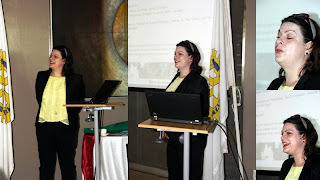Next week I will include pictures of the South African Dinner organised by Alex Gano for the Rotary Club of Charleston, Illinois as a fundraiser for our projects.
And to think that last week was St Patrick's Day! I thought this might be appropriate.
Last week's meeting was a fascinating talk about treated mosquito nets by Christina Anderskov of Bestnet Europe. It just adds weight to our Malaria initiative. It was a fascinating presentation. Christina had just come from Liberia where malaria is a major problem. We are lucky in South Africa as incidents of malaria are very isolated as most of the country just doesn't have the climate for the mosquitos.
Our unofficial official photographer, Jenine Coetzer, is back so you don't have to put up with my happy snaps any more. Here she is in action!
The collage of members, as you can see, shows many more individuals than my quick flash round the room.
Our next meeting is on Wed 28th March and there is an extra meeting in the evening to induct Yvonne Chaka Chaka as an Honorary Member of Johannesburg New Dawn.
Wednesday the 28th March, 6.00 pm for 6.30 at the Saca
Skills Kitchen for Yvonne Chaka Chaka’s induction as an honorary member of New
Dawn. The cost is R120 per person for a cocktail and drinks evening. Either
transfer the money to the New Dawn bank account (FNB Parktown, 62217422609,
branch no. 250455 or the FNB number for electronic transfers, 250655) or bring
cash. Bring lots of friends, too, as this is a very important evening for the
club. Please let me know by return email if you are coming, so that we get an
idea of numbers for catering purposes. And please bring a bottle of your
favourite white wine. To book contact Mike Vink.
Mind over antimatter
Makoto Fujiwara Photo by Josh Fassbind
Long before Makoto Fujiwara began trapping antimatter, he was a timid Rotary Foundation Ambassadorial Scholar whose primary concern was passing his classes. The Rotary Club of Kofu South, Japan, had sponsored him to study physics at the University of British Columbia (UBC) in Vancouver. Fujiwara, who had found out about the Ambassadorial Scholarships program as a Rotaractor, landed on Canadian soil in the summer of 1992.
In spite of his fears, he ended the year with the highest marks in his class. And he abandoned his plan to return to Tokyo to work as an engineer, instead finishing a two-year master’s program and going on to earn a doctorate in physics at UBC. Though he accepted a postdoctoral position through the University of Tokyo, at CERN (the European Organization for Nuclear Research) in Geneva, he returned to Canada in 2004. As a research scientist at TRIUMF, Canada’s national laboratory for particle and nuclear physics in Vancouver, he has since helped lead an international team of researchers to a groundbreaking discovery in antimatter – a breakthrough that has propelled him to the forefront of particle physics research.
“Sometimes I wonder what kind of life I would have had if I had gone into industry,” says Fujiwara, who is also an adjunct professor of physics and astronomy at the University of Calgary. “So far I can’t complain.”
When he came to Vancouver as an Ambassadorial Scholar, one of the first Rotarians Fujiwara met was Jane LePorte, of the Rotary Club of Burnaby-Deer Lake, B.C. She gave him some household items, including a quilt for his bed, and connected him with other scholars and Rotarians. Affectionately characterizing him as an “absent-minded professor,” she notes that the shy young man she met now speaks confidently at conferences around the world. “Rotary deserves a lot of credit for helping him come to a new country and blossom,” she says.
Fujiwara describes himself as an inquisitive kid who was fascinated by science fiction and who occasionally watched Star Trek. He liked making radios in elementary school, an interest triggered by uncles who were amateur radio enthusiasts.
Now, his attention is focused on antimatter, a mystery of modern physics. According to the big bang theory, matter and antimatter were created in equal amounts when the universe was born. However, virtually no antimatter remains, a phenomenon that science has been unable to explain. “Our approach is to produce antimatter atoms artificially in a lab and then study their properties, to see if there is any difference between matter and antimatter that might explain why antimatter disappeared,” Fujiwara says.
“Makoto is an exceptionally smart scientist,” says Nigel Lockyer, director of TRIUMF. “All scientists are smart at some level, but he combines it with a great deal of energy and drive.”
This combination enabled Fujiwara to secure funding for his research and to recruit about 15 Canadian scientists to study the issue. He and his team spend six months of the year at CERN, using its particle accelerator to run experiments.
Their first breakthrough in antimatter occurred at CERN in 2002, when they created large quantities of antimatter atoms. Then, in November 2010 at TRIUMF, Fujiwara and his team trapped antimatter for the first time – a major feat, because as soon as matter and antimatter meet, they annihilate each other. This past June, the team built on its achievement by containing antimatter for more than 16 minutes, long enough to begin studying its properties.
“Now that we have trapped antimatter, there are so many things we can do with it,” Fujiwara says. “It’s impossible to stop now. It’s this whole new field of science opening up in front of me.”
Looking back, Fujiwara credits Rotary with opening the doors that led to his success. “I wouldn’t have studied physics if I hadn’t come to Canada as a scholar,” he says. “It was the start of everything for me.”





No comments:
Post a Comment
Note: only a member of this blog may post a comment.